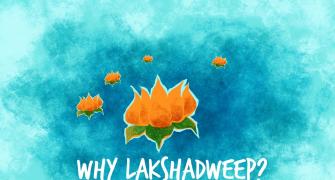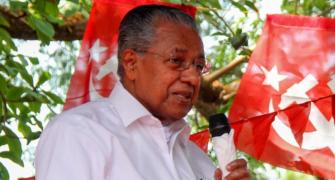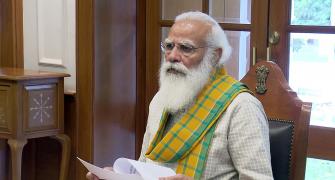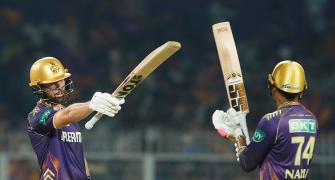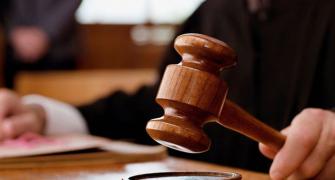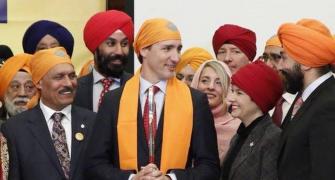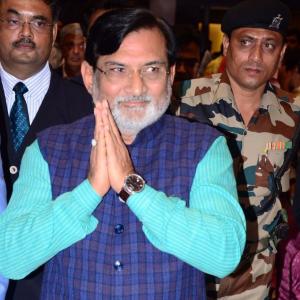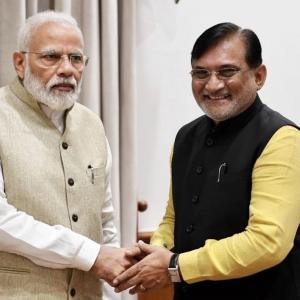'The administration started intruding into the kitchens and bedrooms of the local community.'
'For the first time in 50 years the people of Lakshadweep who have till now never raised their hands, got out on the streets and started raising their voices.'
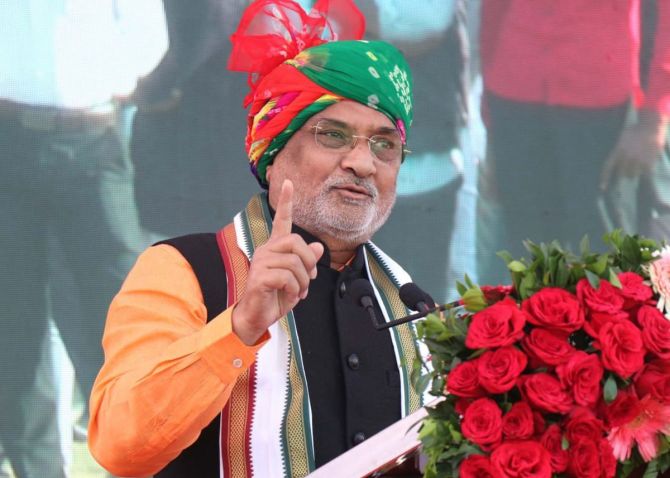
Why is everybody talking about Lakshadweep, the smallest Union Territory in India?
Though Lakshadweep in Malayalam means a lakh islands, this UT consists of 36 small islands in the Arabian Sea.
The language spoken in Lakshadweep is Malayalam, and Muslims constitute 99% of the population.
The headquarters of the UT or that of the administrator was at Kozhikode in Kerala till 1964 and only after that, it was shifted to Kavaratti.
5, December, 2020. Enter a new administrator called Praful Khoda Patel, a member of the Bharatiya Janata Party from Gujarat, a man who was a minister when Narendra Damodardas Modi was chief minister.
Patel introduced four controversial proposals -- the Lakshadweep Animal Preservation Regulation, the Lakshadweep Development Authority Regulation, the Prevention of Anti-Social Activities Regulation and the Lakshadweep Panchayat Regulation.
Not only the Opposition parties, but human rights activists, environmentalists and ecologists are outraged by the proposals which, according to experts, would destroy the ecological balance of the islands and also its community.
"Why have they reactivated the Goonda Act in Lakshadweep? Because any kind of demonstration or opposition will be dealt with through penalty. Lockups are full in the island where they remained empty for the past 50 years."
Anitha Santhi, an ecologist who specialises in the ecology of Lakshadweep, tells Rediff.com's Shobha Warrier why Patel's proposals are detrimental to the very existence of the islands.
You are one of the signatories of a letter written by experts to the governor of Kerala as an appeal for the people of Lakshadweep. What prompted you to write the letter?
I have been associated with the islands, its ecology and the community from 1994 as an ecologist and an environmental educator.
So, when we read about the new administrator and all the new reforms he was bringing in and also the response of the community, we felt we had the responsivity to respond.
Though we are from the mainland, we know the pulse of the islands. That was the reason behind the letter to the governor.
We are of the opinion that the so-called reforms are a gross violation of human rights and unconstitutional.
According to former administrator Wajahat Habibullah, the Lakshadweep Development Authority Regulation 2021 (LDAR) introduced by the new administrator in the name of development, would result in the destruction of the islands and not development.
As a person who knows the islands, in what way do you think it will result in the destruction of the islands?
The new LDAR 2021 document is purely based on the mainland concept of development which cannot be applied in Lakshadweep due to two limiting factors.
The main factor is directly connected to the ecology of the islands, that is the land area.
There is very little inhabitable land area in Lakshadweep; only 32 sq kms is occupied by the citizens of the islands.
The next factor is the availability of fresh water.
You need fresh water for any kind of development, and it is a very scarce in the islands.
The fresh water that is available in the island scomes only from rain, and any kind of over extraction of ground water will result in the intrusion of the sea.
The land is also scarce there and for all the development planned by the administrator like mining, highways, tourism, etc, they have to take land from the inhabitants of the islands.
Now the question arises, what is the definition of development?
The administrator says he wants to develop Lakshadweep on the lines of the Maldives....
We know the situation in the Maldives, and it is not a good model to be emulated especially in the context of climate change.
It (the Maldives) is sinking. So, the development model that is followed in the Maldives is not applicable even in the Maldives.
Though there are 36 islands in Lakshadweep, only 10 are inhabited.
You have to understand why only 10 are inhabited when the population density is 400 people per sq km. Why are they not spreading into the other 26 islands? That is because there is no fresh water.
So, this is a limiting factor as far as the development of Lakshadweep is concerned.
Yes, Lakshadweep needs to develop, but not on the lines of the mainland.

What exactly do you mean by development?
Development in the normal sense means to raise the standard of living of the local people.
Development should not be to enrich the corporates or the industrialists or the rich.
Development should be to give power, and livelihood to the local community.
But all the development that is planned right now is not going to enhance the lives of the people of Lakshadweep as has been proven earlier.
We know tourism did not take off there. Why? Because it was planned on the lines of the mainland.
You feel the administrator has no clue about the island or the people living there?
I don't want to point fingers at one individual; it is the attitude of the developer.
But the issue erupted in a big way only after Praful Patel came out with LDAR 2021....
It has erupted now because the Lakshadweep Development Authority Regulation gives prime power to the administration to exercise any development plan.
The local panchayat has no say or role in it. The panchayat was not consulted at all.
In fact, vesting all the powers with the administration goes against the 74th Amendment of the Constitution.
It is said that the document is put in the public domain on the 24th of April, and they have given time till the 19th of May for people to respond.
Yes, it is in the public domain, but it is not accessed by the public of Lakshadweep.
And it is not in the local language of the island.
It erupted when the administration started intruding into the kitchens and bedrooms of the local community; into the kitchen, by saying you can't eat beef.
Into the bedroom, by saying only people with two children only can contest the elections.
Then, a lot of daily wage workers in the field of education and health sectors were thrown off from their jobs overnight.
So, for the first time in 50 years the people of Lakshadweep who have till now never raised their hands, got out on the streets and started raising their voices against these issues.

What is the hidden agenda behind entering the kitchens and bedrooms of the local community?
What is the hidden agenda? It is quite obvious.
The main agenda of the administration is LDAR, which is to grab the land.
What is happening is a very subtle and subversive annihilation of the community so that they could grab the unconditional land rights of the people belonging to Scheduled Tribes.
If you look at the development that is happening in Narmada, Tehri and all over Kerala through mining and deforestation, it is annihilation in a subtle manner.
When you call it development, you can't oppose it. If you oppose development, you become anti-national.
Why have they reactivated the Goonda Act in Lakshadweep? Because any kind of demonstration or opposition, will be dealt with through penalty.
This is very frightening for the islanders.
Lockups are full in the island where they remained empty for the past 50 years.
Now, schools are used to lock up people who are protesting.
They are using Coastal Regulation Zone Act to demolish all the small huts on the shore where they keep their boats, dry the tuna, etc.
But the fact is, the CRZ Act that is applicable in the mainland cannot be applied in the islands.
Lakshadweep has a very region-specific CRZ plan that is made in consultation with the panchayats.
You know the island for decades. Would you say the inhabitants co-exist with the environment without disturbing the biodiversity?
Of course. If they had not co-existed, if they had not developed a system utilising the resources in an eco-sensitive manner, neither they nor the island would have survived.
The traditional community knows that they cannot survive without the ocean or the coral reef.
It is based on this knowledge that they have developed their livelihood.
I can give you many examples to show the eco-sensitive approach of the community.
One such activity is tuna fishing which, in fact is mainstay of the economy of the island.
They do it in the most unique, sustainable and the eco-friendliest 'pole and line' way.
They were introduced to the pole and line tuna fishing by the visionary Administrator Wing Commander Moorkoth Ramunni.
In pole and line fishing, you have to have fish as live baits, which they take from the lagoon.
The fishermen know the ecology of the live bait fish in the lagoon, and how much live bait they can take when they go for tuna fishing.
If you over extract the live bait fish to catch more tuna, the population of the live bait fish will collapse. So also the lagoon.
In fact, they don't even catch half of the tuna that migrate to the area.
It's done because they are sensitive to the ecology of the lagoon and do not want to disturb it.
Other than the lives of the local inhabitants, how much the new LDAR will affect the flora and fauna of the region?
It will affect the flora and fauna immensely.
When they are going to take the small holdings of agricultural land called pandaram land where they cultivate vegetables, bananas, greens, etc. to build highways, they are going to take not only the nutritional base of the island but livelihood too.
On the western side of the island, you have the coral reef.
And on the eastern side, you have the thick vegetation which can withstand wind and sea erosion.
When they develop the island, they are going to destroy a lot of vegetation.
When climate change and sea erosion are a reality in Lakshadweep as it is a reality in the Maldives, the presence of thick vegetation on the eastern side is an absolute necessity for the survival of the island.

You feel in the long run, this kind of development can even destroy the entire islands itself?
First, it will destroy the way of life.
Then, the very fragile the ecological balance between the sea and the land.
For example, when you are dredging the reef or deepening the lagoon to bring in more ships, you are inviting trouble.
When the tsunami came in 2004, you know the Maldives was ravaged, but Lakshadweep withstood the huge waves and the wind.
Why? Because the coral reefs protected Lakshadweep.
That is because the islanders live by giving maximum respect to the coral reef.
There are natural breaks in the coral reefs which they use as entrance for the boats.
But if you break the reefs to bring in ships, sea water will first enter the lagoon, then the island and finally will cause sea erosion.
There are so many examples all over the world of islands getting destroyed completely.
So, consultation with the local community is absolutely essential for development.
When the document is not even available in the local language, how do you expect the local community to know what is in it?
Feature Presentation: Aslam Hunani/Rediff.com

